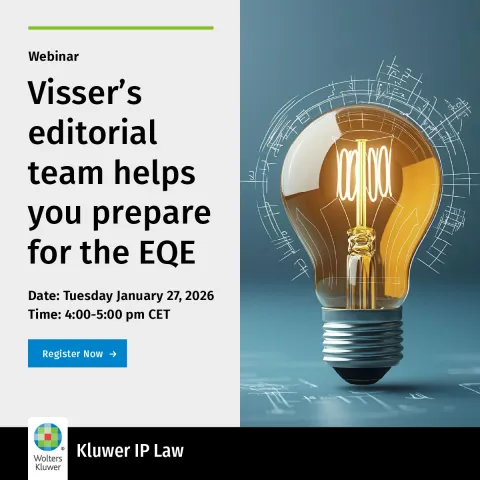My New Year’s Wishes for the EPO (in Russian)
December 31, 2017
In 2017 Russia has been in the news quite a lot, even though mostly not for good, due to its despicable efforts to influence the elections in the US and the Brexit referendum via social media. We will yet have to see and hopefully learn more about who supported these efforts in the US and UK and whether their impact may even have been decisive for the outcome of these democratic votes. But since we just had Christmas and it is time for New Year’s wishes, let us for now happily remember better past times and, specifically, three (or four) important Russian words we learnt from this great country with a lot of admiration. It just so happens that each of them is a perfect New Year’s wish for the EPO that has likewise been in the news a lot in 2017, and mostly not for good, unfortunately (unless you are satisfied with the official EPO news releases). So, without further ado, here are my good wishes for the EPO in 2018: Mir, Glasnost and Perestroika!
**
1. Mir (Peace)
I strongly hope and wish that the EPO will find back to internal peace, which has been so seriously disturbed over the past years, mostly due to the EPO management’s “very rigid regime with a heavy-handed approach“ (C. Ernst, Chairman of the EPO’s Administrative Council) and a new and very controversial policy that seems to put speed and output before quality – except where it would have been necessary the most, i.e. in the much neglected Boards of Appeal.
I also hope that legal peace will be restored in regard to the much reported case of Mr. Corcoran, of which there is an excellent and up to date summary on wikipedia.
This topic immediately brings me on to my second wish:
**
2. Glasnost (Openness, Transparency)
I wish the EPO and particularly its Administrative Council (AC) Glasnost. At least in my opinion, the Administrative Council is the “window” of the public into the EPO and vice versa. According to the European Patent Convention, the Administrative Council is the one and only control instance of the European Patent Office (if one leaves matters of constitutional law on a side for the moment). This means, however, that the AC should take its role as a control instance seriously, and certainly much more seriously than in the past, and visibly interfere where things go wrong rather than cover them up. Due to its unique position, the Administrative Council also is accountable (and should be held accountable) for the EPO’s policy and the EPO’s management to the public.
However, all of this requires that the AC communicates with the public directly, not through an EPO management filter, and openly. In particular, the AC should have its own website, independent from the EPO, where it publishes and explains its decisions so that the public is able to understand and discuss them. The AC should also be directly approachable by the public and by EPO staff members who feel unfairly treated by their management. Perhaps an Ombudsman would do the EPO good.
Having said that and reverting now to the case of Mr. Corcoran, I cannot but be critical in regard to the current situation. This is what the AC officially stated on the EPO website:
In a closed session, the Council took a final decision in a disciplinary case against an employee appointed by the Council - a case which had attracted significant public attention. This decision was taken with due regard to all relevant elements. The Council expressed its satisfaction at having closed the case. In particular, it underlined its expectation that now - after a long period of intense debate - legal peace would be restored.
So do you, dear readers, understand from this communiqué what the AC’s “final decision” in regard to Mr. Corcoran was? I don’t. And this is my point on Glasnost. I wish the EPO, its AC and all of us more transparency and openness, and definitely a much-improved communication with the public.
It is easy to chime in the AC’s hope that “legal peace would be restored” following its “final decision” and I certainly would love to do. But the question that tortures me is whether these are just pious words for the consumption of the public, or whether they actually reflect a generous decision reinstating Mr. Corcoran into his rights as a Board of Appeal member at least for the time he was unable to fill out this role due to his unlawful (ILO AT) suspension from the office. Unfortunately, this seems to be still unclear.
Mathieu Klos from JuVe reported that Mr. Corcoran has been reinstated but not reappointed. Assuming this is true, the question still remains what exactly “reinstated” means. If it were to mean that he was reinstated just for the 10 remaining days of his regular tenure as Board of Appeal member (which ends on 31/12/2017, i.e. today), but not for the time period that he lost due to its illegal removal from the office - according to the ILO AT decisions -, then I doubt very much that such a decision would restore legal peace. I sincerely hope that the AC found a better and fairer solution than this one. We will see.
**
3. Perestroika (Restructuring)
If Mr. Battistelli’s tenure as President of the EPO was/is good for anything, then it is to demonstrate to the public that the European Patent Organisation has no effective system of ‘checks and balances’ and is too susceptible to abuse of power. The Boards of Appeal are still far from being a truly independent court instance; and it is at least possible, if not even predictable, that this may or will result in constitutional problems in Germany, which may also have an impact on the planned UPCA.
Therefore, it is maybe a good time now to remember decision R 19/12, which in my view is one of the most important internal review papers about the EPO ever written. (Unfortunately, it seems to be only available in German.) As this decision shows, we already had a fairly far-advanced discussion in the years before 2004 about this issue, which led to a “completely worked-out draft of a basic proposal for a revision of the EPC in order to achieve organisational and managerial autonomy of the Boards of Appeal within the framework of the European Patent Organization” (CA/46/04).
21. Im Jahr 2004 wurde dem Verwaltungsrat ein vollständig ausgearbeiteter Entwurf eines Basisvorschlags für eine Revision des EPÜ zur Umsetzung der organisatorischen Verselbständigung der Beschwerdekammern des Europäischen Patentamts im Rahmen der Europäischen Patentorganisation vorgelegt (CA/46/04). Sie würde den Beschwerdekammern unter Leitung eines Gerichtspräsidenten die Stellung eines dritten Organs der Europäischen Patentorganisation neben dem Europäischen Patentamt und dem Verwaltungsrat verleihen und damit dem Gerichtspräsidenten, der auch Vorsitzender der Großen Beschwerdekammer sein sollte, eine vom Amt und dessen Präsidenten unabhängige Stellung einräumen. Der Verwaltungsrat war in seiner Sitzung im Juni 2004 der Meinung, dass das Projekt reif für eine Diplomatische Konferenz sei und auf die Tagesordnung einer solchen Konferenz gestellt werden sollte (CA/85/04, Nr. 68). Auch dazu ist es bis heute nicht gekommen.
According to R 19/12, the AC in 2004 was of the opinion that this project is ripe for a diplomatic conference and should be put on its agenda. “But this also has not happened until today”, noted the Board laconically about 10 years later. There is a rumour that Germany then blocked this project, as the German representatives in the AC were afraid that this might result in a complete uncoupling of the BoA and their subsequent move to a different country. If this was true, I – being a German - could only shake my head about such an undignified Kirchturmpolitik (parish pump politics). Of course, it makes eminent sense to leave the Boards of Appeal in Munich - and in a proper building with the requisite space for offices and hearing rooms -, but the issue of a court’s or board’s venue should never determine the discussion about its proper construction and judicial function.
In my opinion at least, it would be very advisable to enter into a fresh discussion in 2018 on whether the EPO really has the right structure to satisfy the needs of its stakeholders, who (among other things) want and need an independent, efficient, competent, but above all fair judicial body to decide on European Patents and applications. The concept of fairness includes that the parties are given an effective right to be heard, including the possibility to file appropriate requests also in the appeal instance, depending on and in response to the procedural situation. Fairness to the parties should never be sacrificed to procedural efficiency; otherwise we would need no boards of appeal at all.
In addition, it also seems to me that we should have a discussion about Art. 13 EPC and whether the ILO Administrative Tribunal really is the best forum to safeguard elementary staff rights. At least in my opinion there are substantiated doubts in this regard, which may justify a discussion whether a judicial reform of the EPO should also include this aspect.
With this, I wish the EPO and all of our readers a genuinely happy New Year, and may Mir, Glasnost and Perestroika come to the EPO...
...bistrot
That is: fast.
You may also like















Depressed EPO staff
Excellent article ! Bravo Thorsten ! FYI internally we all know that if decision R 19/12 was NEVER translated into FR and EN this was on direct instructions of Battistelli fuming that the Boards dared to issue it at the first place (this alone is unacceptable since it deprives the public to access an important piece of legal information in the 3 official EPO languages). Now the worse part: Battistelli is said (from reliable sources) to prepare himself for the position of : first President of UPC Court in Paris (since the treaty foresees that the first President will be a French citizen) So if after 6 years of total mis-management of the EPO on all accounts, countries involved in IP matters such as Germany, England, Italy, CH, BENELUX and the Scandinavian, do not put a FINAL END to this circus, expect him back soon for more funny stuff... With this said let us keep hope in better days AFTER he is gone, since the next 6 months will be deplorable ones for sure
Francesca
Thank You for this good summary. Regarding a diplomatic conference: staff has asked several times for it. The EPC 2000 even inserted a specific article, as at the time of drafting the EPC 2000 the UPC discussions were not closing to an end, and therefore any possibly necessary amendment of the EPC for this was postponed. To discuss these matters, the contracting states decided to meet at at least misterial level at least once each five years to discuss the progress and possible necessary amendments of the EPC. Furthermore, monsieur Président has been asked by staff during one of his famous "meet the president" happenings, why the AC has not started any preparations for one of these ministerial conferences according to article 4a EPC when the AC asked for proposals regarding the DG3/BoA reforms. His answer was, that he does not want a diplomatic conference. If politicians would meet, that would be like opening a can of worms: you can set a schedule, but the results will be completely unforseeable. Also: some 30 years ago, there have been proposals to hire new BoA members only under the condition, that once their technical board has been issued new (or renewed) contracts, their board would move to Berlin. This would've resulted in a separation of the BoA from the EPO managements main building within 10 years, thus delivering the increased perception of independence. The proposal included moving supervisory elements of the EPO (IT development, audit, finances) to Berlin too, and thus over some 20 years stop examination in Berlin.
Francesca
please correct a typo: Working link: https://en.wikipedia.org/wiki/Art._23_1/15,_Art._23_2/15_and_Art._23_1/16 from article: https://en.wikipedia.org/wiki/Art._23_1/15,_Art._23_2/15_and_Art._23_1/16) You need to remove the closing bracket in your link to wikipedia under the topic "Mir". I wish you a wonderful new year, and thanks for these wishes! (no need to publish this comment)
Attentive Observer
Dear Thorsten, Congratulations on your article. To the point, if not to the liking of the Chairman of the AC, and certainly not to the one of the tenant of the 10th floor. Some further views on the different topics you mention: 1) Mir In order for internal peace to come back again, the conditio sine qua non is that the Napoleon of the 10th floor leaves the EPO. What he has done to damage the EPO will however not disappear as quickly as him, and his “bad vibrations” will stay in the office for a long time. Certainly as long as all his minions are still in office, with a special mention to the so called “Head of HR”. I even do not dare to think that what she is doing has anything to do with “human" resources. Once her protector has gone, it is to hope that she will lower her tone, be less apodictic and sure of herself. It is also to hope that all those people will be send back to France, quicker as they came. 2) Glasnost This might remain a wish, as like all dictators, they are afraid from anything which could bring light into their handlings. As far as the AC is concerned, the ludicrous situation of the tail wagging the dog, should come to an end, the sooner, the better. The AC should not only have its own website. It should have its own staff, nominated by it, and not by the president. The Secretariat of the AC is made up of persons which are under the hierarchical authority of the president. There are in clear conflict of loyalty/interest. It is high time to change this as well. The first action of the new chairman in re Corcoran, does not let a lot of hope come up, when it comes to the control function of the president by the AC. Furthermore, how can an action be taken against a person, when this person is not even heard. What is this for a parody of justice? The AC is wrong when it thinks that legal peace will be restored by simply putting a lid over the problems. Even if it was not said expressis verbis in its judgement, the mere acknowledgement by the ILO that the sanction taken again Mr Corcoran was illegal, implies for anybody with two cents of gumption, that he should be allowed to do his period at the BA which he could not do due to the sanction imposed on him. The ILO has not just decided that the withheld salary is to be given to him, but that he is reinstated. And that means more than just for a few days! What has been done, starting with the Chairman of the BA, and by the AC, is not even lip service to the ILO judgement. 3) Perestroika There is not only the question of independence of the BA vis-à-vis of the President. Following the speech of Prof. Broß before the Max Planck Institute in 2018, the document CA 46/04 was mentioned during the discussion. CA 46/04 and CA85/04 should have been followed by actions. And if it is true that Germany torpedoed this attempt for such stupid reasons as explained, it should be a prime duty of the new chairman of the AC, a German, to at least convene the conference of ministers of the Contracting States responsible for patent matters as foreseen in Art 4a EPC. EPC 2000 is in force since December 2007, i.e. for now more than 10 years; it means that already the second conference should have been convened by now. Why such an inaction? I can only agree that the present messy situation, especially at the BA, is due to the actual tenant of the 10th floor. The BA are not independent, they are even less than before, even if there has been an attempt to improve the perception of independence (sic) of the BA. The President of the BA should not merely exercise the right to propose the members of the BA upon delegation by the President of the EPO, cf. R 12d (2) EPC. He should be allowed to decide by himself. One of the problems the BA presently encounter is that the actual tenant of the 10th floor has blocked the nominations of members, as retaliation after R 19/12. By limiting the budget devoted to the BA, the blocking of posts can continue. What are the criterions to be used for assessing the performance of members of the BA, cf. R 12d (3) EPC Why an external committee has to have a say in this matter? I understand something else under independence. The BA should have their own budget, and not the budget which is given to them by the president. Why the president does have a right to be heard about the rules of procedure of the BA? This is not innocent. If the RoP are not to the liking of the president, he has the power to give less budget to the BA. Continuously raising the appeal fee to the level envisaged by the pseudo manager of the 10th floor also amounts to a denial of justice. No Court in no Contracting state is self-supporting, the more so since there is no value dependent fee, and rightly so, before the BA. The whole change carried out is merely farcical, and will in the long run cost a lot of money to the users of the system. Why was there never any protest coming up from this side in general, and “epi” in particular? A reorganisation of the BA along the lines proposed in 2004 should also be such that a revision of decisions of the BA is not only limited to procedural aspects, but also to substantive aspects. Only then it will be possible to consider that the BA and the EBA will have the position of a court. If an applicant sees his application refused or its patent revoked, he has no further mean of redress. But if the opponent loses before the BA, he can continue the battle. This is an aspect which may play a role, not only before the German Federal Constitutional Court, but also before the CJEU, should it one day say something about the UPC. There is a lot to be done, and I agree as well, as soon as possible! Techrights: fingers directly or indirectly. This means not even by a mere link embedded in your libels! It is not because comments are public, that you are entitled to take them over and put them in your publications. I do not want to be used by you.